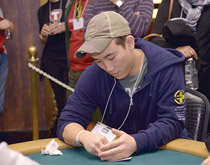It’s early on a Friday morning, and George Orn, after a busy start to the second semester, is just sitting down to an interview with PricewaterhouseCoopers. A stressful way to end the week, for any student. But for Orn, it’s just the first item on an itinerary that reads as follows: Do interview, run home to change and grab luggage, get to the airport, fly to Las Vegas, and compete in Caesars Entertainment’s MBA Poker Championship.
For Orn, a first-year Tepper grad student, such a schedule isn’t entirely out of the ordinary. In 2009, only a year out of college, he was left jobless after the economy took a downturn. Concurrent to his ensuing job search, he chose a different path: professional poker.

He had picked up the game for fun in his early college days and always seemed to have the most chips at the end, which is why he decided to put his skills to the professional test. He began competing in cash games and tournaments in Chicago, eventually rising through the ranks to high-stakes games in New York, Atlantic City, and Las Vegas. His former hobby earned enough money to pay the bills.
His success attracted the interest of trading companies. The skill sets that make a great poker player—the abilities to assess probability and risk under pressure, to be strong in social situations, and to keep a level head in victory and defeat—happen to be the attributes that make successful traders.
But Orn, after a post-poker-playing stint with a trading company, realized that he preferred the consulting work he’d been doing after college, so he decided to return to school to refocus his career. That decision brought him to Tepper, where he is now a full-time student pursuing his MBA. He has found time to play poker, too, in Tepper’s Poker Club.
Through those games, he learned about Caesars Entertainment’s MBA Poker Championship, an annual competition and networking event held in Las Vegas. Although Orn competed in the competition mostly for fun, he still brought his best game. At tournament’s end, he was the chip leader at the final table and returned to campus richer for the experience—$4,300 to be exact.
Despite the winnings, he doesn’t miss his professional days. “My dad was a construction worker,” he explains. “He provided value by building houses. Then, for as long as he lives and the house stands, he can say, ‘I built that.’ Poker, it’s just probabilities.”
He aspires to a career that he says will produce a real benefit for society, “something more tangible than, ‘I have aces, he has kings.’” For fun, there’s always poker.
—Olivia O’Connor (A’13)



